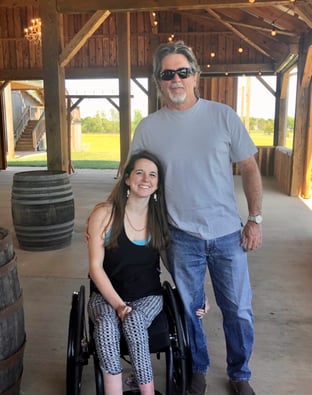The Work for Contentment
Join Our Movement
What started as an idea has become a national movement. With your support, we can influence policy and inspire lasting change.
Become an Advocate
The list goes on. The theme is: I let my disability hold me back from living, instead of finding a way to let it enhance my living.
College was where I really grew into myself. I was still very focused on my rehabilitation, but I gave myself the slack of blending into my peers a little bit, and having a social life. I even acquired my first post-disability boyfriend, which was something I felt was an impossibility and was exceedingly excited about. During college, I split my life in four directions: my relationship, my rehabilitation, my social life, and my studies – in no particular order. “Overflowing” is our new word.
This is where I began to excel, and where I saw my biggest mistake up to that point. That is, I wasn’t focusing enough on my relationships, and I wasn’t allowing myself to slow down. Me, personally, within relationships is where I succeed in not only my happiness, but also my confidence. Without friends and community, I was comfortable with my “outsider” status, as opposed to the completely normal young woman I am – just sitting down. I was both physically and emotionally alone, until I changed my perspective to “alongside.”
It took me years, too many years, to understand that, in order for me to recover from the trauma of my accident, I needed to learn to love and accept myself, and the confidence will follow. Once I had the confidence part down, I learned to shrug off my shortcomings and say “whatever. It’s just how I am.” That, in every way, has been the key to my recovery.
Everybody is different, so I’m only telling you what worked for me:
Don’t let your disability give you an excuse for not participating in life. Do what it takes to turn a tricky circumstance, in my case paralysis, into a favorable one. Don’t let anything or anyone stand in the way of you living your greatest life. Figure out who or what gives you confidence and spend time with it or them. Most importantly, be patient with and love yourself through every stage of your life.
For me, that meant loving myself as a disabled woman. That’s not the most appealing-sounding, I realize, but the patience and confidence that follows has been pivotal to the recovery of both my mind and my body. Put in the effort to reach acceptance and join me in saying “whatever.” I promise you that it’s worth it.
